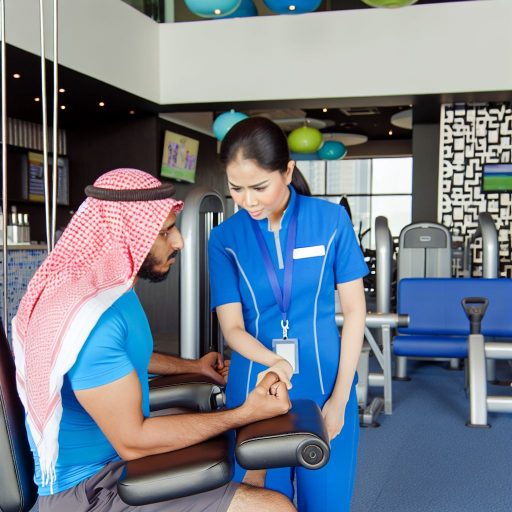The role of a restaurant host or hostess is crucial in ensuring a smooth dining experience for customers.
They are the first point of contact for guests, setting the tone for their visit.
As the initial face of the restaurant, hosts and hostesses greet and seat guests, making them feel welcomed and valued.
They help create a positive first impression, setting the stage for a pleasant dining experience.
A host or hostess is responsible for managing reservations, ensuring that tables are allocated efficiently to optimize seating capacity.
They must balance the flow of guests to prevent overcrowding and minimize wait times.
In addition to seating guests, hosts and hostesses also handle phone calls, take to-go orders, and assist with any guest inquiries or concerns.
They must be knowledgeable about menu items, daily specials, and restaurant policies to provide accurate information to customers.
The importance of the host or hostess position in the restaurant industry cannot be overstated.
They play a crucial role in managing guest expectations, coordinating with servers and kitchen staff, and maintaining a smooth operation during busy dining hours.
Overall, restaurant hosts and hostesses are essential in creating a positive and memorable experience for guests.
Their friendly demeanor, efficiency, and attention to detail contribute to the overall success of the restaurant and help build customer loyalty.
Greeting and Seating Guests
From the moment guests walk through the door, the restaurant host/hostess plays a crucial role in setting the tone for their dining experience.
Greeting guests with a warm smile and friendly demeanor is essential in making them feel welcome and valued.
It sets the stage for a positive interaction and can leave a lasting impression.
Once the guests have been greeted, the host/hostess must escort them to their tables.
This involves guiding them through the restaurant, taking note of their preferences and any special requests they may have.
Providing menus promptly ensures that guests can begin perusing their options and making selections without delay.
Seating guests in a timely and efficient manner is paramount to ensuring a smooth flow of service.
The host/hostess must be aware of table availability, reservation status, and any special accommodations that need to be made for certain guests.
Transform Your Career Today
Unlock a personalized career strategy that drives real results. Get tailored advice and a roadmap designed just for you.
Start NowBy coordinating seating arrangements effectively, they can maximize table turnover and optimize the restaurant’s capacity.
Throughout the seating process, the host/hostess must also pay close attention to the comfort and satisfaction of the guests.
They should check in periodically to ensure that everything is to their liking and address any concerns or requests promptly.
By being attentive and responsive to the needs of the guests, the host/hostess can enhance their overall dining experience.
Greeting and seating guests is a critical duty of a restaurant host/hostess.
By welcoming guests warmly, seating them promptly, and ensuring their comfort, they contribute to the overall success of the dining establishment.
They leave a positive impression on guests.
- Welcoming guests as they arrive at the restaurant
- Escorting guests to their tables and providing menus
- Ensuring that guests are comfortable and well attended to
Managing Reservations
Listed below are some of the essential duties of a restaurant host/hostess when it comes to managing reservations.
- Taking reservations over the phone or online
- Keeping track of reservations to ensure smooth seating
- Communicating reservation details to the serving staff
A restaurant host or hostess plays a crucial role in ensuring that the dining experience for all guests is smooth and enjoyable.
One of the primary responsibilities of a host or hostess is to take reservations from customers, whether it’s over the phone or through an online reservation system.
This requires excellent communication skills and the ability to multitask effectively.
After taking reservations, the host or hostess must keep track of them to ensure that the restaurant can accommodate all guests in a timely manner.
This involves carefully managing the dining room layout and coordinating with the serving staff to prepare for incoming reservations.
Communication is key when it comes to managing reservations.
The host or hostess must effectively communicate reservation details to the serving staff, including the number of guests, any special requests, and specific seating preferences.
This helps to streamline the dining process and ensure that guests receive the high-quality service they expect.
In addition to coordinating reservations, the host or hostess must also be prepared to handle last-minute changes or cancellations.
This requires flexibility and quick thinking to adjust seating arrangements and accommodate new or changing reservation requests.
Managing reservations is a critical aspect of the host/hostess role in a restaurant.
By effectively handling reservations, communicating details to the serving staff, and adapting to changes as needed, a host or hostess helps to create a positive dining experience for all guests.
Transform Your Career Today
Unlock a personalized career strategy that drives real results. Get tailored advice and a roadmap designed just for you.
Start NowExplore Further: Effective Seating Strategies for Hosts/Hostesses
Communicating with Guests
One of the essential duties of a restaurant host/hostess is to effectively communicate with guests throughout their dining experience.
Providing Information on the Menu, Specials, and Restaurant Policies
- Hosts/hostesses must be knowledgeable about the menu items, daily specials, and any restaurant policies.
- They should be able to describe dishes, recommend popular items, and inform guests of any promotions or discounts.
- Having a thorough understanding of the menu helps hosts/hostesses provide accurate information to guests.
Answering Questions and Addressing Any Concerns or Requests
- Guests may have dietary restrictions, food allergies, or specific preferences which hosts/hostesses should be able to accommodate.
- Hosts/hostesses must be ready to answer any questions guests may have about the menu or restaurant.
- If guests have concerns or requests, hosts/hostesses should handle them promptly and courteously.
Handling Complaints or Issues in a Professional Manner
- Guests may occasionally have complaints or encounter issues during their visit to the restaurant.
- It is essential for hosts/hostesses to listen to guests, empathize with their concerns, and find a resolution.
- Responding to complaints professionally and promptly can help diffuse tense situations and ensure guest satisfaction.
Effective communication is key to providing excellent customer service as a restaurant host/hostess.
By being knowledgeable, attentive, and professional in their interactions with guests, hosts/hostesses can help create a positive dining experience for all patrons.
Find Out More: Dress Code and Appearance Standards for Casino Dealers
Coordinating with Servers and Kitchen Staff
One of the essential duties of a restaurant host/hostess is to coordinate with both servers and kitchen staff to ensure a smooth dining experience for guests.
This involves clear communication, organization, and teamwork.
Communicating seating assignments and special requests to servers
- Assigning tables to servers based on sections and rotation.
- Informing servers of any special requests or accommodations needed for specific guests.
- Ensuring that servers are aware of any VIP guests or special occasions in the restaurant.
Updating servers on table status and guest needs
- Informing servers of the status of each table, including when guests are seated, ordering, or ready to pay.
- Updating servers on any changes in reservations or walk-in guests that may affect seating availability.
- Communicating guest needs or concerns to servers promptly to address any issues effectively.
Ensuring timely and efficient service for guests
- Coordinating with the kitchen staff to ensure that orders are prepared and served in a timely manner.
- Monitoring the flow of the dining room to prevent long wait times for guests.
- Assisting servers in providing exceptional customer service by anticipating guest needs and addressing concerns promptly.
By effectively coordinating with servers and kitchen staff, a restaurant host/hostess plays a crucial role in ensuring that guests have an enjoyable dining experience.
Clear communication, organization, and teamwork are key to success in this aspect of the job.
Explore Further: Top Skills Every Successful Host/Hostess Needs
Maintaining the Host Stand and Lobby Area
As a restaurant host/hostess, one of the key responsibilities is to ensure the host stand and lobby area are well-maintained at all times.
- Keeping the host stand clean and organized
- Monitoring and managing the flow of guests in the lobby area
- Assisting with seating arrangements during busy times
It is essential to make sure that the host stand is kept tidy and free from clutter.
This includes clearing off any dirty dishes or menus and ensuring that the area is presentable for guests.
Being aware of the number of guests waiting to be seated is crucial.
The host/hostess should keep track of incoming guests and communicate with servers to ensure a smooth flow of seating.
During peak hours, the host/hostess may need to help coordinate seating arrangements to accommodate large parties or ensure that guests are seated in a timely manner.
This requires strong communication skills and the ability to multitask effectively.
Overall, maintaining the host stand and lobby area plays a significant role in creating a positive experience for guests and ensuring the restaurant operates efficiently during busy times.
Delve into the Subject: Customer Retention Strategies for Fitness Centers

Upselling and Promoting Specials
As a restaurant host/hostess, one of your essential duties is to upsell and promote specials to guests.
Transform Your Career Today
Unlock a personalized career strategy that drives real results. Get tailored advice and a roadmap designed just for you.
Start NowThis helps increase revenue for the restaurant and enhances the overall dining experience for customers.
Recommending Additional Menu Items or Specials to Guests
When seating guests or taking their orders, you can recommend additional menu items or specials to enhance their meal.
For example, if a customer orders a steak, you can suggest adding a side of garlic mashed potatoes or a flavorful sauce to complement the dish.
By suggesting these additional items, you not only increase the average check amount but also provide guests with a more satisfying dining experience.
Make sure to highlight the features and benefits of each recommendation to entice guests to try them.
Promoting Special Events or Promotions at the Restaurant
Another way to upsell and enhance the guest experience is by promoting special events or promotions happening at the restaurant.
This could include holiday-themed menus, live music nights, or happy hour specials.
Inform guests about these events as they arrive or while they are dining to generate interest and encourage them to participate.
Make sure to provide all the necessary details, such as dates, times, and any special offers, to entice guests to attend.
Encouraging Guests to Return for Future Visits
In addition to upselling and promoting specials during their current visit, it is important to encourage guests to return for future visits.
Building a loyal customer base is essential for the long-term success of the restaurant.
Offer incentives such as loyalty programs, discounts on future visits, or exclusive invitations to special events for returning guests.
By creating a warm and welcoming environment and providing exceptional service, you can leave a lasting impression on guests and make them want to come back again.
Upselling and promoting specials are crucial tasks for a restaurant host/hostess.
By recommending additional menu items, promoting special events, and encouraging guests to return for future visits, you can enhance the dining experience for guests and contribute to the success of the restaurant.
Essential Duties of a Restaurant Host/Hostess
When it comes to the essential duties of a restaurant host/hostess, handling cash and payment processing is a crucial aspect of the job that requires attention to detail and accuracy.
The host/hostess plays a key role in ensuring that the payment process runs smoothly and efficiently for both takeout orders and walk-in guests.
Accepting Payments for Takeout Orders or Gift Certificates
One of the primary responsibilities of a restaurant host/hostess is accepting payments for takeout orders or gift certificates.
This involves processing transactions accurately and promptly to ensure customer satisfaction.
The host/hostess must be familiar with the restaurant’s payment policies and procedures to efficiently handle these transactions.
Transform Your Career Today
Unlock a personalized career strategy that drives real results. Get tailored advice and a roadmap designed just for you.
Start NowProcessing Payments for Walk-In Guests and Managing the Cash Register
Another vital task for a restaurant host/hostess is processing payments for walk-in guests and managing the cash register.
This includes handling cash transactions, credit card payments, and any other forms of payment accepted by the restaurant.
The host/hostess must accurately calculate the total bill, apply any discounts or promotions, and provide the guest with a receipt.
Coordinating with Servers to Ensure Accurate Payment Processing
Effective communication and coordination with servers is essential for accurate payment processing.
The host/hostess must work closely with the serving staff to ensure that all orders are correctly entered into the point-of-sale system and that payments are processed accurately.
This collaboration helps prevent errors and discrepancies in the payment process, which can impact the guest experience.
Handling cash and payment processing is a critical responsibility for a restaurant host/hostess.
By effectively managing payments for takeout orders, gift certificates, and walk-in guests, as well as coordinating with servers to ensure accuracy, the host/hostess plays a significant role in providing a seamless and positive dining experience for guests.
Training and Development
Training and development are essential aspects of being a successful restaurant host/hostess.
As a host/hostess, you are often the first point of contact for customers.
It is crucial to provide excellent service right from the start.
One of the primary responsibilities in this role is to train new host/hostess staff on the procedures and protocols of the restaurant.
This includes familiarizing them with the reservation system, seating arrangements, and any specific customer service guidelines that need to be followed.
In addition to providing initial training, it is also important to offer ongoing feedback and guidance to help improve the performance of the team.
This can include sharing best practices, addressing any areas of improvement, and recognizing achievements.
Encouraging teamwork and effective communication among staff members is another key aspect of training and development.
By fostering a positive and collaborative work environment, you can help create a more cohesive team that is better equipped to handle the demands of a busy restaurant.
Overall, investing in the training and development of your host/hostess staff is crucial for the success of your restaurant.
By providing the necessary tools and support, you can ensure that your team is well-prepared to deliver exceptional service to every guest who walks through the door.
- Providing training to new host/hostess staff on procedures and protocols.
- Offering feedback and guidance for improving performance.
- Encouraging teamwork and effective communication among staff members.
Importance of Restaurant Hosts and Hostesses
The role of a restaurant host/hostess is crucial in ensuring a positive dining experience for guests.
Transform Your Career Today
Unlock a personalized career strategy that drives real results. Get tailored advice and a roadmap designed just for you.
Start NowThey greet and seat guests, manage reservations, and handle inquiries.
Hosts and hostesses are the face of the restaurant.
Hard work and dedication can make or break a guest’s experience.
It is essential for them to excel in their duties.
Essential duties include greeting guests, seating them, and coordinating with servers.
They ensure the smooth flow of the dining experience.
The position requires a high level of attention to detail.
Excellent communication skills are a must.
Additionally, they must multitask in a fast-paced environment.
This demanding role requires dedication and patience.
A positive attitude is vital to creating an exceptional dining experience for guests.
Host and hostesses play a vital role in setting the tone for the guest’s visit.
Their contributions make them an integral part of the restaurant team.
Additional Resources
24 Restaurant Positions and Their Roles Explained – Sling
Should I include my restaurant experience on resume for unrelated …
[E-Books for Sale]
The Big Book of 500 High-Paying Jobs in America: Unlock Your Earning Potential
$19.99 • 500 High-Paying Jobs • 330 pages
Explore 500 high-paying jobs in America and learn how to boost your career, earn more, and achieve success!
See All 500 High-Paying Jobs of this E-Book
1001 Professions Without a Degree: High-Paying American Jobs You Can Start Now
$19.99 • 1001 Professions Without a Degree • 174 pages
Discover 1001 high-paying jobs without a degree! Unlock career tips, skills, and success strategies for just $19.99!




